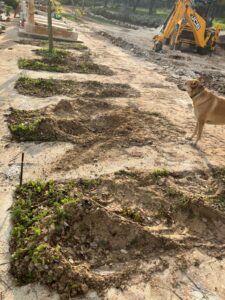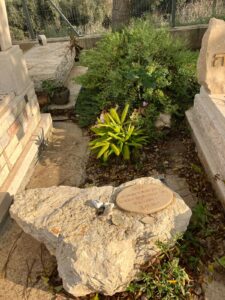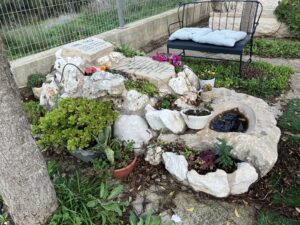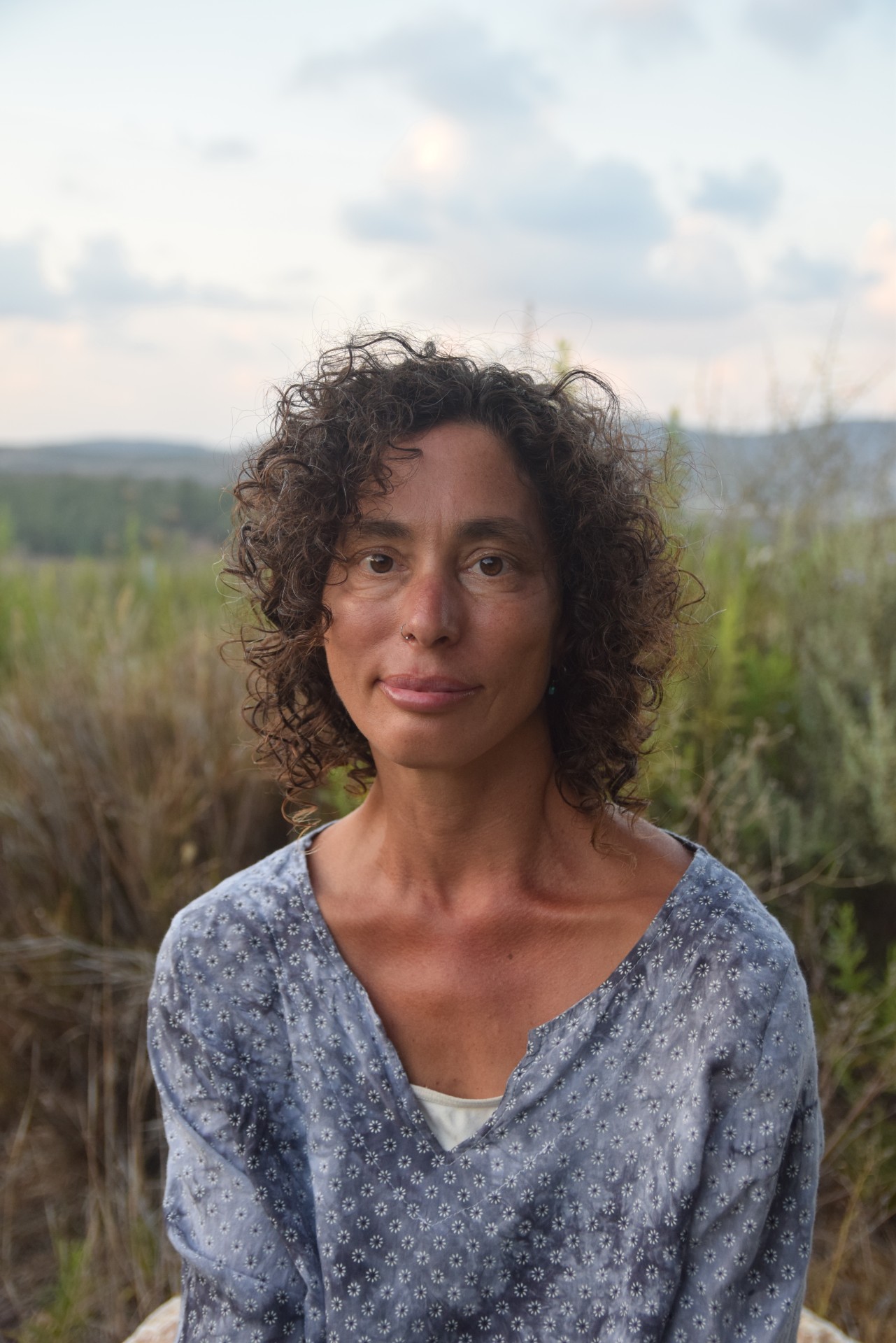I am out walking my dog, thinking about my 20-year-old son, Nachum, who is going to another soldier friend’s funeral today, the second in two months. Both of his friends were fighting in Gaza. Since Oct. 7, death has not been a gentle hand tapping on the shoulder of those around me when their time has come, but a violent fist ripping them from life before their time in a way that feels so cruel.
So much death, more and more people dying every day — not natural deaths, but deaths by human hands, the result of war and terror, part of an ongoing bloody conflict on this land from the River to the Sea — that I, a Jewish Israeli peace activist, have been working together with my Palestinian Israeli friends to end. I cannot accept that this is the way life, or death, is supposed to be. And yet, this is my reality.
Nachum’s best friend, also fighting in Gaza, was wounded yesterday. The surgery was successful, and he will survive. The soldier next to him when the Hamas soldier came out of the tunnel shooting was not so lucky. The doctors let my son’s friend out of the hospital to go to the shiva.
Nachum did not serve in the army; he did national service, instead. He was exempt from army service because he has FSHD, the genetic muscular disease I live with and passed on to him. I have done much inner work to accept natural illness, suffering and death. Will I be able to do enough inner work to accept all the violent human-inflicted death around me now, too? Should that even be my goal?
I think of the Serenity Prayer: “God, grant me the serenity to accept the things I cannot change, the courage to change the things I can and the wisdom to know the difference.” That’s it: I don’t know the difference anymore. I continue walking.
The forest opens onto the fields. Olive orchards to my right, avocado fields ahead. Saplings just planted stand spread apart, supported by plastic encasings holding them upright and protecting them from the elements.
They remind me of the field where the Supernova music festival was held that weekend of Oct. 7 — how it looks now, not how it looked then. Then, hundreds of young people simply enjoying moving their bodies to trance music in nature were murdered there in cold blood, chased down by Hamas militants and bands of armed Gazan civilians.
Since the massacre, loved ones of these victims have brought photos of the dead and stuck them in the ground, as if they are still dancing. On Tu Bi’shvat they will plant actual trees there, too — a memorial. I cry as I walk, thinking of them. These festival-goers were some of the most peaceful members of society, there just to celebrate life; instead, they were met with the most brutal of deaths.
If only they had protective casings around them, like these baby trees do. Instead, the government abandoned them, sending troops to the West Bank to protect settlers who had built a sukkah — in provocation — in the Palestinian village of Hawara, where settlers had perpetrated a pogrom some months before. The government had decided to protect violent provocateurs instead of peaceful dancers.
Hersh, the son of our friends, tried to escape. His arm was blown off while throwing back a grenade at his attackers. The last time his parents saw him was on a video Hamas filmed and publicized on social media during the massacre. He is boarding a truck at gunpoint to be taken across the border into captivity. There are many videos like that one, some with much more horrific footage — of rape, murder, torture, and the maiming of corpses and live bodies.
I literally want to vomit on the side of the path.
But I look up and see a glorious day in the Galilee — blue skies, a carpet of green before me, the first sun after heavy rains. Tiny white crocuses are pushing their way up through the earth, thanks to the rains. Soon, these buds will open to reveal their yellow sun-like centers. A hint of new beginnings, I hope. One day, when this is all over. I want to embrace it all, to believe the flowers, the birds, the sunshine. But it is hard now. Too hard.
Suddenly, I come upon a crack in the earth along the length of the path for the next fifty or so meters — as if there had been a small earthquake since I was last here, symbolic of these times. There had already been so much division and separation in this place; then Hamas’s attack hit like a lightning bolt, the shape of this crack, causing such a chasm I am not sure we, as a society, here in Israel-Palestine, can cross it.
I continue walking along the length of the crack. The kibbutz cemetery is up ahead. I spot from afar the grave of a 20-year-old soldier from a neighboring town, who was recently buried here. The Israeli flag is draped over the stone. These soldiers are our children, protecting us, their parents. Isn’t this against the laws of nature?
Hamas’s attack hit like a lightning bolt, causing a chasm that I am not sure we, as a society here in Israel-Palestine, can cross.
As I approach the cemetery, I notice a bulldozer digging a grave. I enter, treading carefully past fresh mounds of dirt. It is not one grave this bulldozer is digging but a whole group of them. My heart drops. I had not checked the names or hometowns of the soldiers whose souls had left those beautiful bodies I saw beneath the headlines with their smiling faces this morning.
Could so many have been locals? I know it shouldn’t matter; all lives are precious. But it does feel different when I know them personally, or if they live nearby. While I mourn all the lives lost, here, and in Gaza, the farther away they are, the more abstract they feel. That is human nature, whether fair or not. Either way, I just want this war to end.
 I ask the man in the bulldozer — Abed, from the Arab village across the road — what he is doing. The already-prepared graves are full, he tells me, so he is preparing more — digging rectangular holes and filling them with sand, so they are easier to dig out at the funerals.
I ask the man in the bulldozer — Abed, from the Arab village across the road — what he is doing. The already-prepared graves are full, he tells me, so he is preparing more — digging rectangular holes and filling them with sand, so they are easier to dig out at the funerals.
I had not known this — like I had not known soldiers do not have the purifying ritual-washing of the body before burial in both Judaism and Islam. Until I decided to start a burial society on our kibbutz after the war began, and I learned the customs.
According to Judaism and Islam, soldiers killed in combat are considered purified already by their act of sacrifice. They are also buried in a casket, unlike other Jewish or Muslim burials in Israel. Is that to give them special honor? Or is it because often their bodies are so mutilated, they need the box to hold the remains?
I think of all the people so brutally murdered on that “Black Sabbath.” The forensic team had to use DNA testing to identify bodies and body parts. At the funeral of peace activist Vivian Silver, there was no body. We had thought Vivian was one of the hostages, only to find out six weeks later she had been murdered on Oct. 7. It took that long to identify her remains; they had been burned and mutilated so completely.
According to Judaism and Islam, soldiers killed in combat do not have the purifying, ritual-washing of the body before burial. They are considered purified already by their act of sacrifice.
Vivian, all the others murdered on that day, and all the innocent people who have died because of this war, deserved beautiful and intentional deaths. The tears well up again. I look down into the empty holes in the ground — waiting for more and more death to come.
I approach the soldier’s grave and see someone left a word written in small stones beside it. I cannot make out what it says. I hear he had a girlfriend and decide it was she who left that word written in stones. I am not meant to understand it; it’s a private message to her beloved. My heart cannot take this, but I make myself stay.
Off to the side of his grave are a few old graves, covered in moss. I know their stories. All were children when they died; their parents have since left the kibbutz, perhaps to get away from the place of their grief.
One child, only 1 year old, died in his mother’s arms from an undiagnosed heart defect. Another was born with severe birth defects and died five months later. One was 2 years old and died in a traffic accident. Her mother was driving, I am told. How is she living with that? I wonder.
I walk around to the newer part of the cemetery, where the graves are well-maintained, except one unmarked grave. I stand over it, wondering whose it is. Abed comes down from the bulldozer and approaches. “Do you know whose grave that is?” he asks. I shake my head.
“It’s Sami’s grandmother’s grave.” Sami owns a hardware store in Abed’s village. “She was Jewish, married Sami’s Muslim grandfather. They lived together in the village. You must have heard the story.” I nod my head.
“They couldn’t bury her in the Muslim village cemetery. So, they buried her here.”
We both look down at this stone with no writing. We sigh. Abed goes back to work, and I continue walking among the graves.
I spot the grave of my friend who died seven years ago from cancer. He was the age I am now when he died, 54. It feels younger now that I have kept living. In six weeks, I will be older than him. Strange how that happens. His wife still lives here, without him, in their big house they built together. Some of their children are soldiers fighting now in this war. I pray she won’t have to suffer the loss of a child, too.
There is the grave of my friend’s fetus from her still birth. The baby, Levav, Hebrew for heart, had a severe heart defect discovered in utero (they had chosen her name before they knew this — one of life’s synchronicities that makes me believe there is a Force Connecting All). Levav’s parents decided to terminate the pregnancy. They buried her tiny body beneath a heart-shaped stone — and the placenta behind it, with a tree planted on top. 
And there is the grave of a 6-year-old girl who died of cancer the first year I moved to the kibbutz. Her parents built a park next to their house in her memory; it has a huge mosaic dragon to climb and sit on that the community built together as a project. There are elf statues next to both these graves, watching over these two pure souls. Does a fetus that dies in utero even have a soul? I wonder.
And another grave of a friend who died of Parkinson’s. He was the guard outside my kibbutz’s preschool. He and my youngest son would kick a soccer ball around together every morning outside the preschool. “He’ll be a professional soccer player one day!” my friend would say. My son is now a serious soccer player with professional aspirations, but my friend didn’t live to see that.
There is the grave of the son of my friends. He was in his 30s, with two small children. He had brain cancer. His parents live on my kibbutz, but he lived in South Africa with his wife and children. He came here because of our better medical system. But that did not save him. I was at his funeral; his wife and children were not. I don’t know why.
There are some older folks, too — a man in his 80s who loved to dance. His gravestone has a couple dancing on it and says he was a lover of life. Another lover of life died in his 60s, though. “His love of life knew no limits,” it says on his gravestone. I did not know him but guess he lived life to the fullest even at the end.
And there is the grave of an older woman who loved to walk around the kibbutz with her tiny dog. When dementia set in, her family moved her to a nursing home. When I went to visit, she was hallucinating. She said another kibbutz member killed and flayed her dog. I told her I had seen her dog the day before; her son was walking him. I don’t know if she believed me, but she would forget soon, anyway, that I had even been there at all.
And there are my friend’s parents, buried side-by-side like twin marriage beds in a film from the 1950s. I make a note; this is what I want. Cremation is out of the question — not because I believe my body will be resurrected but because of cremation’s associations with the Holocaust. Because of my love of water, I had considered looking into burial at sea. But Jacob wants to be buried, and I like the idea of my final resting place being by his side.
 There is a grave with a hole carved into the rock, so that it fills with water when there is rainfall. It is full now. A daily swimmer for most of my life, and a rabbi who runs a mikveh (a ritual immersion pool filled with rainwater), I like the idea of this tiny mikveh on my grave. My family would get a kick out of that — “burying her with her pool,” they’d say. “Even usein death she can’t be without it.”
There is a grave with a hole carved into the rock, so that it fills with water when there is rainfall. It is full now. A daily swimmer for most of my life, and a rabbi who runs a mikveh (a ritual immersion pool filled with rainwater), I like the idea of this tiny mikveh on my grave. My family would get a kick out of that — “burying her with her pool,” they’d say. “Even usein death she can’t be without it.”
My family thinks at times that I care more about my daily swim than I do about them. I insist this is not true, but I won’t be around to defend myself after I die. I decide to insist on no eulogies at my funeral, no jokes for people to snicker about my shortcomings or speeches praising my virtues. I’d rather they just let me be. Or no longer be. But be just what I wrote about myself in my memoirs and not what people make of me in their own minds and memories.
On my way home, I think of my son at his friend’s funeral at this very moment as I reach that crack in the earth again. It, too, not only the flowers and the grass, is a result of the rains. I can’t have one without the other. I cannot choose only rejuvenation. There is degeneration too. Even evil.
Death and evil. They are part of life. Even in this cemetery, there is so much life. And even in this land of the living, there is so much death. And even in every pure soul there is the potential for evil, although we must fight against it with all our will and power. Destruction, whether by nature or by human hands, it’s the other side of the rain.
Back home, I sit at my computer to create an ad for a death café I have decided, just now, on this walk, to facilitate. An offering in the face of all the horrible death around me. I can demonstrate, do social action, work for peace, participate in dialogue and reconciliation groups, practice sacred listening and help others heal through spiritual companioning, but I cannot change human nature.
In every pure soul is the potential for evil, although we must fight against it with all our will and power.
And I cannot fight death, whether beautiful and intentional, or horrific and sudden. This offering is something I can do, at least, to ease some suffering and hold others as they face their own mortality.
A longer version of this essay appears on The Jewish Book Council.








2 Responses
Rabbi Haviva is a lovely essay describing her anguish at people she knew and did not know who have died in the hands of the Hamas terrorists . It was indeed a cruel and bloody massacre committed by enemies of the Jewish people who feel that we don’t have the right to live in Israel-Palestime.
Rabbi Haviva’s essay is pure, as she manages to keep politics out of the story. And she almost succeeds until she just can’t contain her hatred towards the “settlers” and makes this totally nonsensical statement:
“….If only they had protective casings around them, like these baby trees do. Instead, the government abandoned them, sending troops to the West Bank to protect settlers who had built a sukkah — in provocation — in the Palestinian village of Hawara, where settlers had perpetrated a pogrom some months before. The government had decided to protect violent provocateurs instead of peaceful dancers….”
So, it’s the fault of the government of Israel and the settlers that Hamas terrorists butchered hundreds of music festival attendees….
Sorry rabbi. This short paragraph is the equivalent of shooting poison arrows through an otherwise very touching and gentle piece.
I am 93 years old, sitting in my comfortable home at my computer in America and feeling totally estranged from those who are going through this horrible war in Israel and Gaza.. I will add to my feelings the word helpless. In my mind, my body is stretching and my arms are reaching to encompass those who are hurting.. It does no good. They can’t feel it.. My Judaism was easy. No stress.. Went to Shul on Shabbos.. We had a Christmas tree because we didn’t want people to know we were Jewish.. A couple of years ago, I started a group called Shalom Salaam Sisterhood.. We met once a month. It was wonderful until the war in Israel. Our group has been ripped apart. My daughter and her boyfriend went to Israel to help. I was glad.. As I look within, I see fire. Please God put out the fire and help them all live in peace.